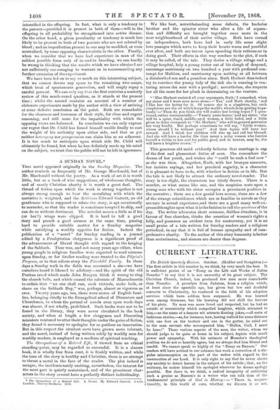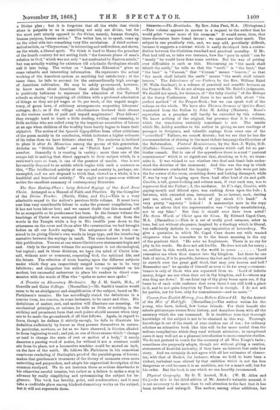CURRENT LITERATURE.
The British Quarterly Review. October. (Hodder and Stoughton.)— The first article in this number is, we think, by very much the best. It is sufficient praise of an " Essay on the Life and Works of Julius Neander" to say that it is not unworthy of its great subject. The Christian Church, indeed, has produced few men more remarkable than Neander. A proselyte from Judaism, from a religion which, at least since the apostolic age, has given but few and doubtful converts to Christianity, he rendered to the faith of his adoption services which have seldom been surpassed. He was learned even among Germans, but his learning did not chill the fervour of his piety. No man was more loved and respected, but he, had an outside of eccentricity which compelled laughter, which attracted to him,—as the name of a famous wit attracts floating jokes,—all sorts of ludicrous stories,—as, for instance, how, having walked for some distance with one foot on the trottoir and one in the gutter, he cried out to the man servant who accompanied him, " Holloa, Carl, I must bo lame!" These various aspects of the man, the writer, whom we should judge to be quite at home in his subject, depicts with much power and sympathy. With his estimate of Neander's theological position we do not so heartily agree, but we always find him liberal and candid. We cannot speak so highly of the " Essay on Bunsen." Our readers will have noticed in our columns last week a correction of a sin- gular misconception on the part of the writer with regard to the resurrection of our Lord. It is only right to say that he never shows any anxiety to detect heresy in the subject of his article ; that, on the contrary, he makes himself his apologist wherever he deems apology possible. Bat there is, we think, a radical incapacity of criticizing such a genius as Bunsen's in a writer who can talk thus of the fundamental principle of God in History : — " There is, unques- I tionably, in this world of ours, whether we discern it or not,
a Divine plan ; but it is forgotten that all the while that which alone is palpable to us is something not only not divine, but for the most part utterly opposed to the divine, namely, human thought, human purpose, human action." The writer has, so to speak, come up on the other side into something very like secularism. A third ecclesi- astical article, on "Chrysestom," is interesting and well written, and shows, on the whole, a liberal spirit. We think it hard to blame the preacher of the fourth century for not setting forth " the forensic phase of man's relation to God," which was not only " not confronted by Eastern minds," but was actually waiting for existence till scholastic theologians should call it into being. The writer on "American Education" gives us some valuable and interesting information. He represents the actual working of the American system as anything but satisfactory ; at the same time, he fails to account for the extraordinarily high average of American cultivation. He may be safely pronounced, however, to know more about American than about English schools. It is positively ludicrous to represent the education of the National schools as aiming "at inspiring all children with a profound admiration of things as they are (of wages at 9s. per week, of the unpaid magis- tracy, of game laws, of arbitrary arrangements respecting labourers' cottages, &c.); as if the village schoolmasters lectured their classes on the various merits of paid and unpaid magistrates! Poor follows! they struggle hard to teach a little reading, writing, and summing, to little urchins who are called away by the imperious necessities of labour at an age when children of the wealthy have barely begun to learn their alphabet. The notice of the Spanish Gypsy differs from other criticisms of the poem mainly in its conclusion, which indicates a higher estimate of its value than we have hitherto observed. The reviewer is inclined to place it after In Memoriam among the poems of this generation. Articles on " British India " and on " Parish Law " complete the number. Generally it is wanting in variety ; more than one of the essays fail in making that direct approach to their subject which, in a reviewer's eyes at least, is one of the greatest of merits. One is not favourably disposed to an article which begins with such a sentence as this, "The intellectual activity of our age and country is, perhaps, un- exampled, and we are disposed to think that, viewed as a whole, it is a healthful and beneficial activity." We ought not to pass over without notice the excellent summary of contemporary literature.







































 Previous page
Previous page